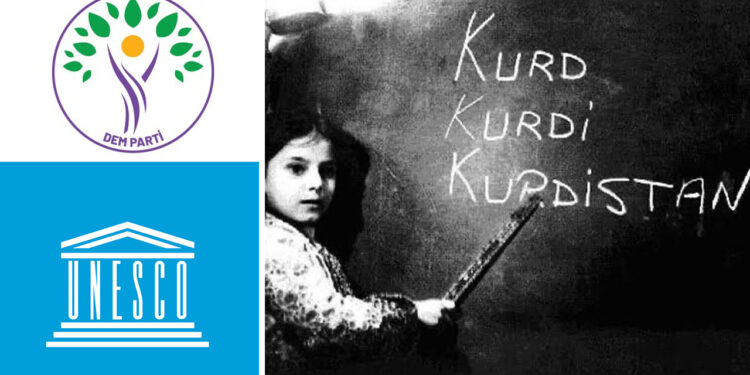Tülay Hatimoğulları and Tuncer Bakırhan, co-chairs of Turkey’s pro-Kurdish Peoples’ Equality and Democracy (DEM) Party, sent a multilingual letter to UNESCO on 21 February, Mother Language Day, calling for mother tongue education and highlighting the “systematic assimilation” and banning of certain languages in Turkey.

Tülay Hatimoğulları and Tuncer Bakırhan, co-chairs of Turkey’s pro-Kurdish People’s Equality and Democracy (DEM) Party sent a letter to the United Nations Educational, Scientific and Cultural Organisation (UNESCO) on Wednesday, International Mother Language Day.
Written in six languages – Arabic, Armenian, Syriac, English, Turkish and Kurdish, and including the Kurmanji and Zazaki dialects of Kurdish, the letter calls for urgent action to address the “systematic assimilation and prohibition of languages other than Turkish” in the country.
The letter outlines the perilous state of linguistic diversity in Turkey, noting that assimilation policies have put numerous languages at risk of extinction. According to UNESCO’s Atlas of the World’s Languages in Danger, 18 languages in Turkey have either disappeared or are under threat, including the Kurmanji dialect of Kurdish.
The DEM Party leaders emphasised that education in one’s mother tongue is a fundamental human right recognised by the UN, the implementation of which is mandated for all member states. However, they said, this right is being denied to the Kurdish, Arab, Armenian, Assyrian, Circassian and Laz communities.
The letter highlighted what it calls policies of linguistic assimilation and cultural genocide, calling them crimes against humanity, and accused Turkey of failing to comply with international resolutions aimed at the protection of languages. It called on UNESCO to send a delegation to Turkey and launch an investigation into violations of mother tongue rights. The party said that all languages in Turkey, including Arabic, Armenian, Syriac, Circassian, Laz, Roma and Bosnian, and Kurdish in particular (both Kurmanji and Zazaki dialects) need to be recognised, and urged the Turkish government to comply with international treaties and fulfil its obligations.
The letter also urges UNESCO to press Turkey to fully comply with the requirements of the UN Convention, including the articles on the rights of the child.
The Kurdish community in Turkey continues to face significant challenges to the preservation and education of its mother tongue against a backdrop of historical and ongoing state restrictions. The UN’s International Mother Language Day is a day on which Kurdish cultural organisations step up their campaign for the recognition of Kurdish as an educational and official language and for the establishment of Kurdish language organisations.
In the meantime Kurdish remains excluded from public services and initiatives, illustrating systematic discrimination against minority languages in Turkey, including in essential services such as health care and domestic violence support.








Leave A Comment